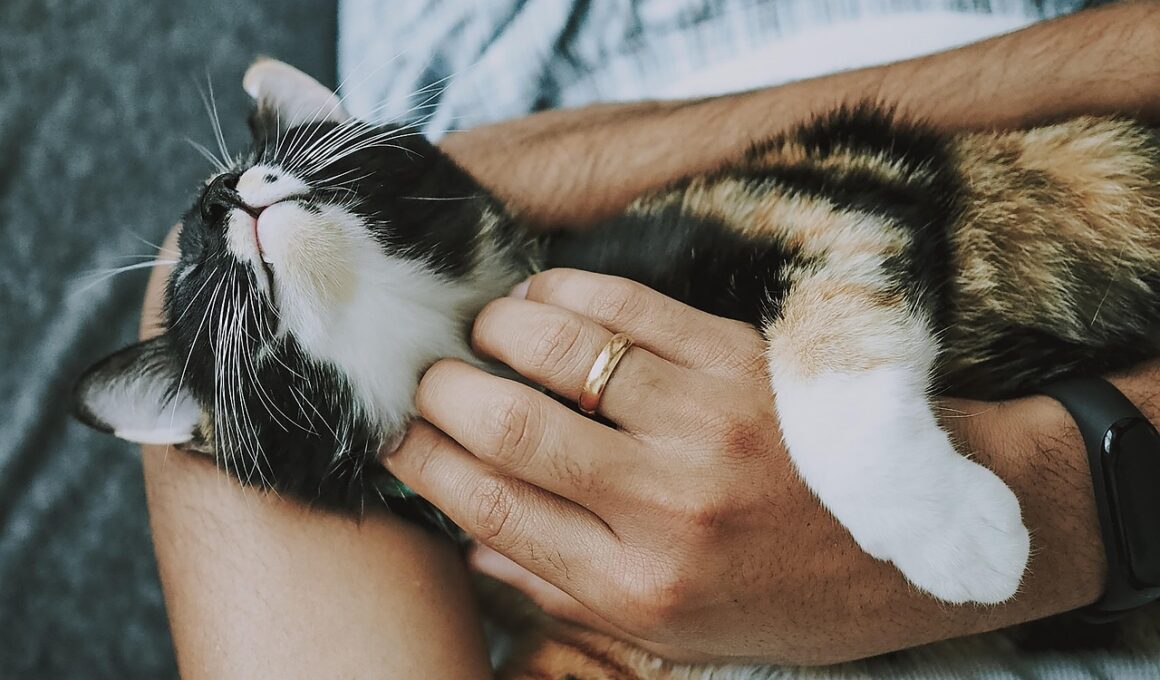Winter Care: Protecting Your Cat’s Teeth During Cold Months
During winter, it’s essential to pay attention to your cat’s dental health, as this season presents unique challenges. Frigid temperatures can lead to issues with your cat’s oral hygiene, particularly if they spend increased time indoors. Limited outdoor activity can contribute to weight gain, which may also affect overall health, including dental condition. To ensure your cat’s teeth stay clean and healthy, consider introducing special toys that promote dental cleaning, offering a dual benefit of play and health. Rubber toys, dental chews, and safe bones can effectively help maintain your cat’s oral hygiene by scraping off plaque. Additionally, it’s vital to incorporate dental treats specifically designed to target and reduce calculus buildup. These overall dental aids can help keep your cat’s teeth from becoming covered in harmful tartar. Regularly inspect your cat’s mouth for signs of distress or unusual behavior, as these may indicate dental pain. Maintaining a care routine can help your cat live a more enjoyable, healthy life throughout the cold months and beyond, fostering long-term dental health.
The Importance of Winter Dental Care
As the winter months approach, the importance of maintaining your cat’s dental health cannot be overlooked. Dental issues can lead to severe infections and discomfort if not addressed. Regular dental care is crucial for all cats, but during colder months, it requires extra attention. The dry indoor air, coupled with diet changes, can cause your cat to experience a build-up of plaque on their teeth more rapidly than expected. Scheduling routine dental check-ups is key during this season to ensure potential problems get identified early. These visits typically include comprehensive examinations, professional cleanings, and the opportunity to discuss any concerns with your veterinarian. Be proactive about your cat’s dental care by routinely checking their teeth at home as well. Look for signs such as discoloration, broken teeth, or bad breath. If you detect any issues, consult your veterinarian without delay for professional guidance. Your cat’s health hinges on maintaining their dental hygiene, and your commitment to their care can significantly impact their quality of life long term.
Incorporating regular dental practices while ensuring a proper winter diet can contribute significantly to your cat’s oral health. A balanced diet not only nourishes your kitty but also provides them with the right texture of food that can assist in removing plaque. Dry cat food can be particularly beneficial for dental health during these months. The texture of dry kibble can help scrape away food particles and prevent tartar build-up. While considering your cat’s diet, ensure it contains adequate vitamins C and E, as these can bolster immune health and support gum health. Chewing is an essential element that helps clean teeth, so providing chewable treats regularly can introduce an interactive method of promoting dental hygiene. Creating an engaging meal routine for your cat can not only enhance their dietary intake but can also factor into their mental stimulation during winter months. Remember, any significant dietary changes should always be discussed with your veterinarian to ensure it aligns with their specific health needs and lifestyle.
Monitoring Your Cat’s Oral Hygiene
Vigilance in monitoring your cat’s oral hygiene is essential during winter months to prevent a whole host of dental issues. Increased time indoors often results in cats having less opportunity to engage in natural chewing behaviors, which can lead to plaque and tartar build-up. Regular brushing of your cat’s teeth is vital, ideally two to three times a week; this practice can reduce plaque accumulation significantly. Use a toothbrush and toothpaste specifically designed for cats to make the experience enjoyable. Start off slowly, allowing your cat to become accustomed to the sensation of brushing. If your cat resists the idea, consider introducing a dental wipe as a gentler alternative to using a brush. Be sure to reward your cat afterwards with praise or a healthy treat to create a positive association with the process. In addition, keeping an eye out for changes in your cat’s behavior, such as difficulty eating or sensitivity to touch around their mouth, can alert you to potential dental problems early on.
One crucial aspect of seasonal tips for maintaining your cat’s dental health during winter is hydration. Cats can sometimes become dehydrated in winter due to drier indoor air and reduced moisture in their food, especially if they consume dry kibble. Ensure your cat always has access to fresh, clean water to help keep them hydrated. You might consider a cat water fountain, as many cats prefer drinking running water over still water. This can encourage better hydration, positively impacting their oral health. Additionally, incorporating some wet food into their diet could be beneficial, as this adds moisture and can help with overall hydration levels. Hydrated cats tend to have better saliva flow, which plays a vital role in naturally cleaning their teeth. Remember, a consistent routine aids in developing good habits for dental care, and adequate hydration is integral to this process. Assess your cat’s water intake regularly and adjust as needed to maintain their well-being during colder months and throughout the year.
Regular Veterinary Visits
Seasonal dental health is not just an at-home endeavor; routine veterinary visits play a crucial role. Your veterinarian can provide professional assessments of your cat’s dental condition, looking for signs of gum disease, cavities, or other dental issues that may arise. Winter can be a harsh time for your cat’s dental health; thus, scheduling an annual dental cleaning can prove invaluable. These visits allow for necessary preventative care that can save you and your pet from unexpected pain or expenses later on. Professional cleanings usually involve anesthesia and a thorough examination, ensuring that all problems are addressed comprehensively. It’s wise to discuss your cat’s dental health proactively with your vet; ask about suitable home care products and preventive measures. By prioritizing these regular check-ups, you take a proactive approach that greatly enhances your cat’s dental hygiene and overall health. Consult your vet for any recommended timelines for dental cleanings, particularly as your cat ages, which can influence their dental health needs significantly over time.
Education is a vital tool in cat dental care, and utilizing available resources can enhance your understanding. Empower yourself by learning about the signs of dental disease in cats. Regularly check for changes in your cat’s eating habits, drooling, or any discomfort while chewing. These can all be indicative of dental issues that may require veterinary attention. Seek out online resources, local workshops, or create a dialogue with your veterinarian about best practices. Also, engaging with fellow cat owners can foster shared experiences and solutions that inform your approach. Make sure to track your cat’s dental health journey by noting any changes or appointments in a pet health diary. This can be especially helpful in managing ongoing care and also aids in conversations with your vet. Using this information to ensure that your cat receives proper home care helps establish routines that contribute to better long-term dental health. By taking these proactive steps, you’re setting your cat up for a healthier, happier life even through the harsh winter months.


